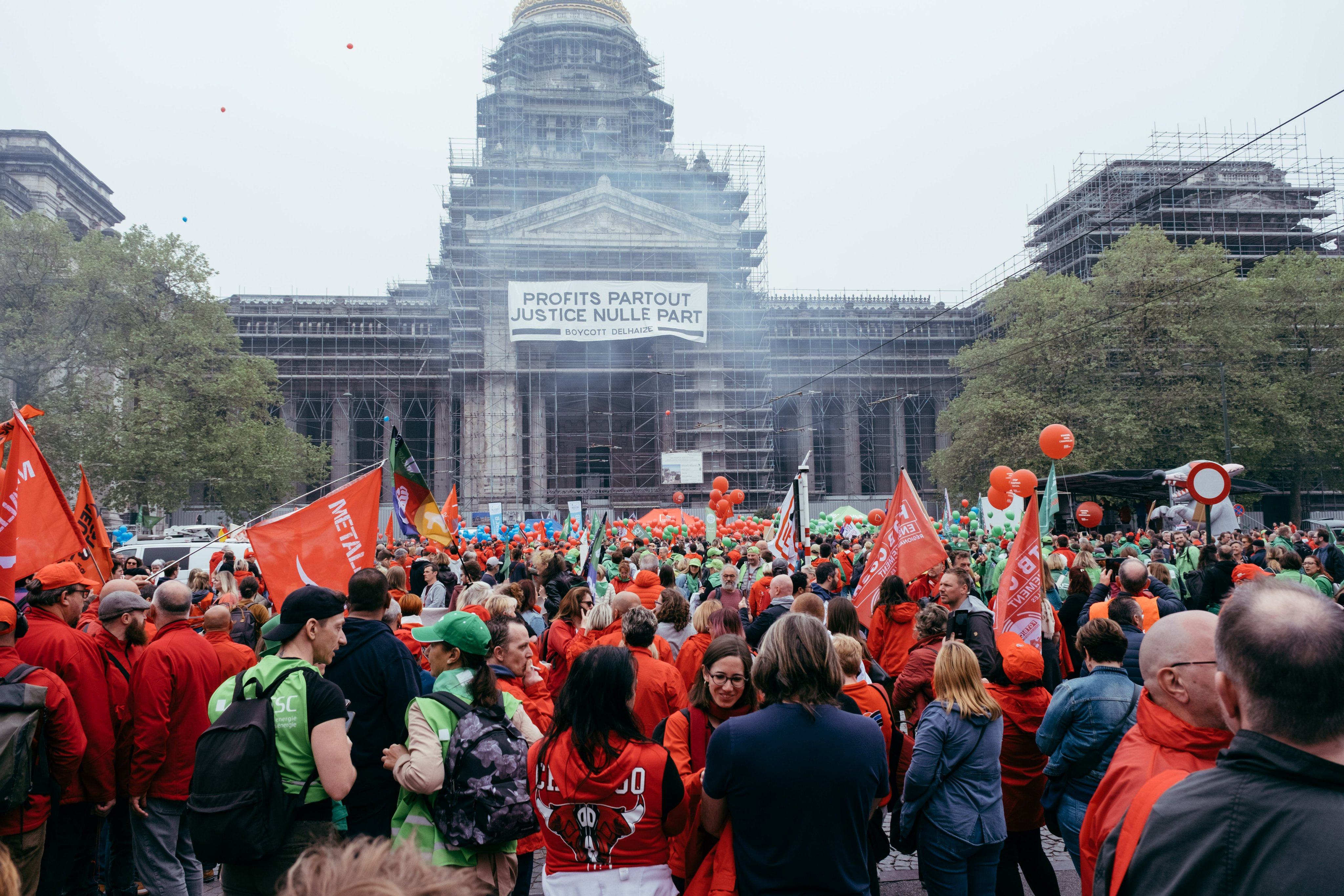On 7 March, the bosses of the Delhaize Group – Belgium’s largest supermarket chain – announced a plan to franchise their 128 stores across the country. As a consequence, 6,500 out of the company’s 10,000 workers risk losing their jobs. The remaining workers will see their wages seriously reduced (by up to a quarter), be robbed of other hard-won benefits, and stripped of union representation. The existing collective bargaining agreement will be unilaterally torn apart. In response, thousands of Delhaize workers have begun an exemplary fight to save their jobs and working conditions.
The Delhaize company expects to see its profits increase five-fold in the next five years as a result of its new plan, which aims to transform the company from a food retailer into a financial real estate company. Many bosses are keeping a keen eye on Delhaize, and are all eager to similarly subcontract their workforces. One union leader correctly said that this manoeuvre by the Delhaize bosses is a “canary in the coal mine” for the workers’ movement.
Alongside health workers, supermarket staff were described as the heroes of the pandemic, the ‘essential workers’ risking their health to keep the shops open. Now they are faced with severe wage cuts and sackings. The struggle of Delhaize workers is galvanising different layers of the labour movement, which on 9 November 2022, flexed their muscles with a one-day general strike over the cost-of-living crisis in Europe.
Apart from this general strike, a few public sector strikes, and a number of sector-wide strikes and national mobilisations in the healthcare and not-for-profit sectors, the leadership of the trade unions has failed to take the lead. Nothing has been made of the mass support for industrial action. For workers in some sectors, there has been no action since a three-day general strike in March.
This is because the trade union leadership understands the implications of a serious struggle in this context, and its ability to shake up the political situation in Belgium. They perceive the current seven-party coalition as the best possible set up, and they do not want to rock the boat.
Delhaize as an example of what is to come
The Delhaize supermarket chain was founded in 1867, and is closely associated with Belgian national pride. But in 2015, it merged with the Dutch company Ahold, showing that money will always trump ‘patriotism’ in the eyes of the capitalists! The Ahold-Delhaize holding company achieved a profit of €2.5 billion in 2022, up 14.5 percent from the previous year: the blood and sweat of thousands of workers. But that's not all. Since 2017, the company has been buying back around €1 billion worth of shares each year – up to €2 billion in 2018.
And yet, this was not enough, and the company bosses are pushing ahead with the franchising plan. The move ignited an all-out strike, bravely fought by the workers at Delhaize. Over 100 supermarkets were closed for several weeks. At some points, we even saw other parts of the sector striking in solidarity, but the leadership of the commercial workers’ union (SETCA-BBTK) blocked such mobilisations by refusing to call its own members in other sectors to actively support the strike.
 The union leadership refused to encourage support for the boycott of Delhaize, which other unions are starting to organise / Image: CNE, Facebook
The union leadership refused to encourage support for the boycott of Delhaize, which other unions are starting to organise / Image: CNE, Facebook
Over the last 10 weeks, the union leadership (rightly) sent an email to their members about a solidarity campaign for garment workers in Indonesia, but (incredibly) refused to encourage support for the boycott of Delhaize, which other unions are starting to organise. This shows what solidarity means for these ladies and gentlemen.
Support for the strike among the population is high – even in Flanders, which is politically dominated by right-wing nationalist parties. 70 percent of respondents support the strikers, according to a poll conducted by Het Laatste Nieuws.
This passive support needs to be actively organised by the trade union movement, with strike committees and strike funds set up across the country. Marxists in Belgium are putting forward this idea in the labour movement, which would mean a return to the best traditions of the Belgian revolutionary workers’ movement.
The Delhaize management is using every trick in the book to undermine the strike. After more than two months, the number of supermarkets opening again is increasing, as individual strikers return to work and the company uses student workers on short-term contracts to fill staffing shortages. Also the company has announced major discounts in a context of high inflation, to tempt shoppers through the doors.
Despite the propaganda by the employers and the media against the striking workers, they are standing firm. However, the situation has worsened in recent weeks, with serious violations of the right to strike. The courts have sided with the Delhaize management and have approved, at the bosses’ request, the sending of bailiffs to break up the picket lines. Under the pretext of the “right to do commerce”, the bosses, aided by the courts and bailiffs are re-opening shops and ending pickets. The aim is to bring the ongoing mobilisation to a quick end. Similar methods are now being used to shut down other, smaller strikes – such as that at a Zara outlet in Brussels earlier this month.
A huge demonstration took place on 22 May in defence of the right to strike. The capitalist system is now being exposed for what it really is to hundreds of thousands of workers, and the mobilisation was a success, as 25,000 workers from across the country held a militant march through the capital. But more will be required to beat back the attack on workers’ rights to organise.
Which way forward?
As we have said, solidarity committees need to be on the agenda. The demonstration of 22 May must be the starting point of a massive campaign, not the end of the process. In the last two or three years, every massive demonstration has been followed by a period of ‘evaluation’ and ‘planning for the next action’. This has left thousands of workers and activists high and dry, waiting for a call to continue the struggle. The trade union bureaucracy fears its own shadow, and uses these mobilisations as a release valve to safely release the pent-up pressure in society, before sending everyone back to work. This must stop!
An important motion, written by local and regional workers in the public sector union (CGSP-ALR), calls on the rest of the trade union confederation to mobilise support for the supermarket workers. They call for a cross-sector strike in solidarity with the Delhaize workers and to defend the right to strike!
The motion also calls for regional assemblies of workers to organise a response to the current attacks on the right to strike, to blockade Delhaize shops on Saturdays in May, and for a public boycott. Other federations like the CNE – the Christian union that organises workers in Delhaize in French-speaking Belgium – are calling for the setting up of solidarity groups, a boycott of the company, and to broaden the struggle to the entire food and commerce sector. These are positive demands.
The negotiations with the management of Delhaize have been a waste of time. The company is not ready to concede the slightest change to its plan. In fact, the company has been using the ‘negotiations’ to buy time in their war of attrition against the workers.
 A huge demonstration took place on 22 May in defence of the right to strike / Image: fair use
A huge demonstration took place on 22 May in defence of the right to strike / Image: fair use
Not one of the seven parties in government – including the socialist parties – dare to take an initiative in favour of the workers. Only the PTB (Workers’ Party of Belgium) is significantly engaged in this conflict, supporting the strikers. But as it wants to maintain good diplomatic relations with the union leaders, it does not propose anything different from the official union positions.
The union leaders say they are very upset by the intransigent attitude of the management, which they claim contrasts with the so-called Belgian tradition of ‘social dialogue’. Indeed the ‘normal’ attitude of the bosses in this situation would have been to involve the union leaders in implementing their plans, in exchange for some minor concessions. But the bosses don’t even grant them that much.
The leadership of some unions demand to be ‘respected’ as a real ‘social partner’. This is incredibly naïve. These people live in the past. Today’s relations between the bosses and the workers are not determined by ‘partnership’ but by naked class interests. In reality this has always been the case, but for a period the capitalists were able to maintain the fiction of the ‘social partnership’. Today, the gloves have come off.
The last to realise this, and to draw all the necessary conclusions, are the union leaders,who continue to act as ‘mediators’ with the bosses at the workers’ expense: and sometimes the so-called ‘socialist’ trade union leaders are the most backward.
For instance, in the transport sector, the Socialist Transport Federation recently reached a secret agreement with Uber, without consulting the drivers, to be recognised as a ‘partner’ - but with no scope at all to negotiate anything. Ironically, in this dispute, the French-speaking Christian union, CNE, has outflanked them on the left!
The battle of the supermarket workers is crucial. It is a key moment for the whole of the workers’ movement in Belgium. Delhaize workers have shown their determination. They need the rest of the class to join the struggle, in order to stop the manoeuvres of the capitalists. It is time that the trade union movement draws up a battle plan!

